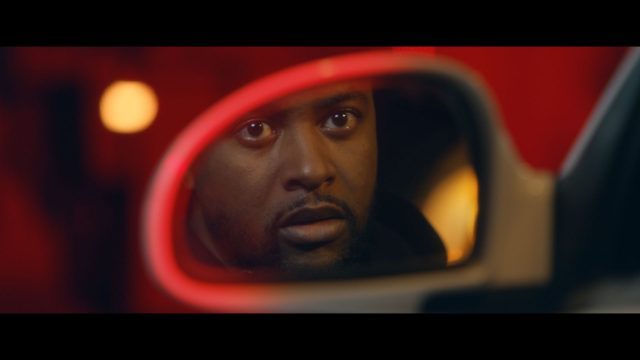
Marcus (Kamal Angelo Bolden) is on a dangerous road in Writers Theatre’s Ride Share
RIDE SHARE
Writers Theatre
Through July 25, $40-$100
Live Zoom talkback July 25 at 4:00
www.writerstheatre.org
www.blacklivesblackwords.org
“I hate my life,” Marcus (Kamal Angelo Bolden) says early on in the virtual one-man show Ride Share, a psychological thriller streaming from Chicago’s Writers Theatre through July 25.
Marcus believed he was on the right road, doing everything correctly. The thirty-three-year-old Black man had just married a lovely woman, Joselyn, at an $85,000 wedding and returned from their honeymoon in Aruba imagining only brightness in his future. He gets called in to work, expecting to be made partner after having put in twelve dedicated, difficult years. Instead, Craig, a white Yale grad who married the boss’s niece, informs Marcus that he is being laid off. “He tells me that I should . . . count this as a blessing, this leaves your path wide open for a great adventure ahead of you. Oh, and by the way, there’s a box waiting for [you] at the front desk.”
Devastated and desperate for money, Marcus becomes a driver for every ride-share company he can find. He shuttles passengers around Chicago in his white Kia from four to ten every morning and again from seven at night till past midnight, jeopardizing his relationship not only with his new wife but with his sanity. Standing atop his car, he details his preoccupation with his rating, like a day trader or a compulsive gambler:
“From the start, ratings have been the bane of my existence. In three months, I’ve earned the ranking of a platinum-level driver. I’ve driven 647 trips with a rating of 4.9, with 629 five-star reviews, 10 four-stars, 4 three-stars, 3 two-stars, and 1 one-star review. I watch these ratings like a hawk. It’s gotten so bad that now I tell people I’m gonna give them five stars in hopes that they do the same. I check these ratings after every ride. I check them again before I go to bed; my wife thinks that I’m obsessed with these ratings. She says, ‘You pay more attention to your ratings than you do to me.” I say, ‘Well, you’re not gonna downgrade me from platinum to blue. She laughed and then she said, ‘You better be careful because your ratings aren’t the only things that could turn blue.’ I love her so much. She’s my everything.”
He spends his down time trying to create better opportunities, learning Spanish by listening to Latin music and hanging out with the other drivers at the airport. “All of us waiting. Waiting for just one ride. Waiting to control our own destinies, waiting on the America dream, waiting.” As his disdain for his passengers grows, particularly for snarky businesspeople and young white women, so does information about a new disease, Covid-19. Then fate steps in when Craig enters his vehicle and Marcus admits to himself that he always has an additional passenger sitting next to him, which he calls his dark rider. “No one can see him but me, our eyes lock, ten generations of rage staring back at me, his mouth gaping wide, uttering nothing but yet I hear his whispers,” he says. Suddenly the road ahead is filled with sin and temptation.
Written by Reginald Edmund and directed by Simeilia Hodge-Dallaway, the cofounders of the activist Black Lives, Black Words International Project, Ride Share, part of BLBW’s Plays for the People series, is a tense and uneasy journey into the mind of a man who has been rejected by a society that refuses to see him for who he is as an individual, as a unique human being. When seen at all, he is judged by the color of his skin and the type of car he drives, representations of systemic racism and income inequality. Bolden (Jitney, Detroit ’67) effectively captures the angst and fear that so many Black men and other people of color have felt so acutely over the last sixteen months (not to mention the decades before), during a pandemic that has led to isolation and economic hardship, as well as a reckoning for racial injustice.
At times, cinematographer Tannie Xin Tang brings the camera right up to Marcus’s mouth, making palpable the years of anguish and torment, ready to emerge and explode at any moment. Edited by Lesley Kubistal, with music and sound by CHXLL Sounds and scenic design by Alexandra Regazzoni, the eighty-minute hybrid work is informed by an ever-threatening claustrophobia that envelops the viewer, sitting at home, where not everyone is always as safe as they think they are. Marcus often is shown looking into his rearview mirror, watching out for what is chasing him, while the road ahead becomes continually darker. The ride can get bumpy, but the ultimate destination is as startling as it is, unfortunately, all too believable.